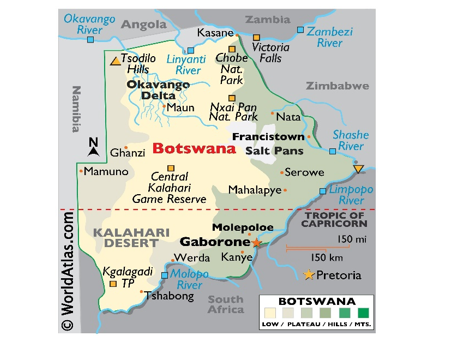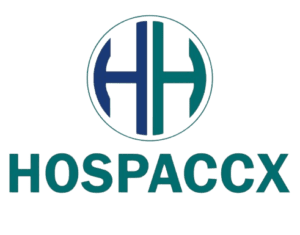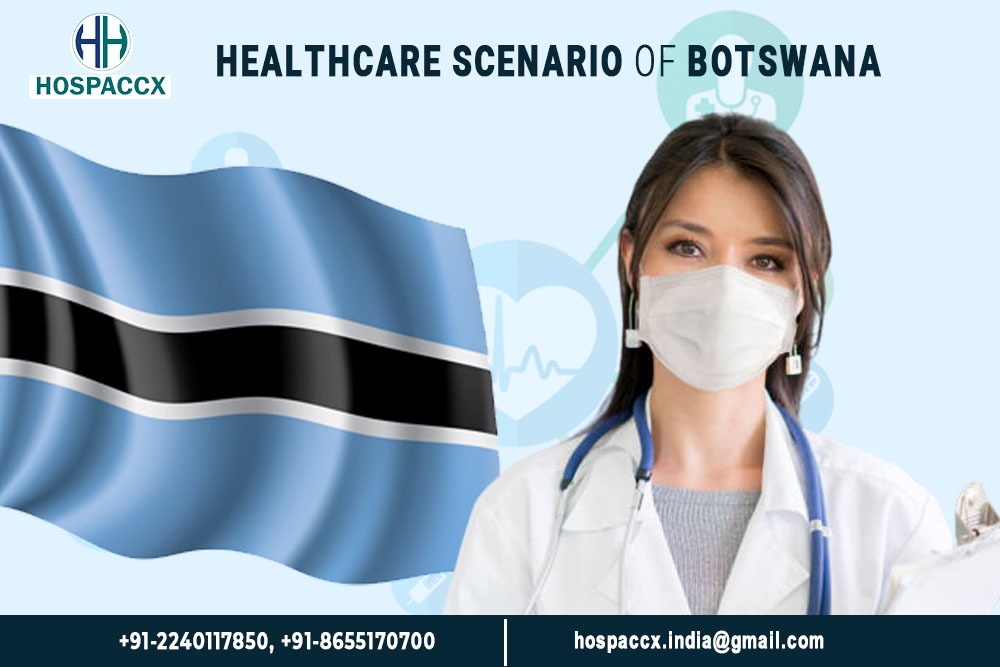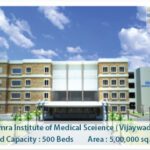Are you planning to build or restructure or venture into any healthcare venture in Botswana? Looking for information about the major healthcare players in government, and private diagnostic centers that are available in Botswana? Are you looking to find out which part of the city is best to venture into or what all facilities are available and what should be planned for a new setup? In this article, Hospaccx Healthcare Consultancy has mapped all on major players in terms of medical facilities and the healthcare scenario of Botswana.
This is the superficial and macro level survey if you need a refined market and financial feasibility or any other study related to healthcare is required you can contact Hospaccx Healthcare business consulting Pvt. ltd on Hospaccx.India@gmail.com or you can visit our website on https://hospaccxconsulting.com/
INTRODUCTION:
Botswana is a landlocked country in the center of Southern Africa. The territory is roughly triangular—approximately 600 miles (965 km) from north to south and 600 miles from east to west—with its eastern side protruding into a sharp point. Its eastern and southern borders are marked by river courses and an old wagon road; its western borders are lines of longitude and latitude through the Kalahari, and its northern borders combine straight lines with a river course.
Botswana’s healthcare system has been steadily improving and expanding its infrastructure to become more accessible. The infant mortality and maternal mortality ratios have been on a steady decline as a result of the improvements that have been made. The country’s improving healthcare infrastructure has also been reflected in an increase in the average life expectancy from birth. Access to healthcare still has barriers for low-income and those living in rural communities. The government of Botswana stresses primary healthcare with an emphasis on disease prevention and healthy living. Like many countries in Sub-Saharan Africa, Botswana is battling high rates of HIV/AIDS and infectious diseases.

DEMOGRAPHIC PROFILE
- Botswana’s total population was 2.65 million in January 2023.
- At the start of 2023, 72.5 percent of Botswana’s population lived in urban centers, while 27.5 percent lived in rural areas.
- The median age of Botswana’s population is 23.8.
HEALTHCARE EXPENDITURE
- The Botswana health system is characterized by ambitious and well-thought-out health plans, including a central role for the public health system that is fundamental to the delivery of quality health care to the general population.
- Budget allocations to public healthcare have increased steadily over the years, with an increasing share of total government spending and a stable share of around 4 percent of GDP. Government health spending per capita reached an estimated P3,500 (US$350) per capita.
- Demands on the health system have been increasing, due to HIV and AIDS from the 1990s onwards, and more recently due to noncommunicable diseases (cancer, diabetes, etc.).
- Although achievements related to HIV and AIDS have been good, other health outcomes – particularly for children – have not been commensurate with the level of spending.
- Child malnutrition remains high for an upper middle-income country, as does infant and maternal mortality. There are major problems with health system efficiency, implementation of projects, and ability to spend budgeted funds.
- Overall there are capacity constraints in the public health system, which go beyond issues related to the availability of funding.

HEALTH INFRASTRUCTURE IN BOTSWANA
- The Government of Botswana is committed to ensuring that all Batswana live long and healthy lives, have access to health care services of the highest standard, and can pursue healthy lifestyles. To achieve this goal, Botswana is shifting the health system towards universal health coverage, through equitable access to quality health services. These services are integrated, safe, and people-centered across the continuum of care, within the context of an overarching primary health care approach.
- In line with global, regional, and national policy frameworks, Botswana is committed to leaving no one behind in health and is scaling up the provision of client-centered, integrated healthcare services. Botswana is a member of different bodies at global and regional levels, and a signatory to various international and regional conventions, protocols, and commitments that seek to improve health outcomes for all, especially women, young people, and children.
- Botswana hospitals provide advanced medical facilities for the residents of Botswana as for travelers to Botswana. There is an availability of government-sponsored hospitals as well as private hospitals in Botswana.
- The Botswana hospitals are equipped with advanced gadgets as well as internationally trained doctors. Most of the doctors in these hospitals are from Botswana itself. Doctors from USA and Europe frequently visit these hospitals to train the local medical teams of the country. the effective coordination between foreign and local doctors helps in the proper functioning of Botswana hospitals.
CATEGORIZATION OF HOSPITALS

- The Primary hospitals in Botswana total 17 in number. Patients with minor diseases and problems are admitted to these hospitals.
- There are 17 District hospitals in Botswana. These hospitals are available in the remote districts of Botswana. The medical teams in district hospitals do the regular check-up of the residents of the country.
- The Patients with serious ailments are referred to the Botswana Referral hospitals by the primary and the district hospitals in Botswana.
MAJOR HOSPITALS IN BOTSWANA
Top Govt/Private Hospitals in Botswana
- Bamalete Lutheran Hospital
It was established in 1934. It is a 134 bedded hospital. The services provided by the hospital include taking care of seriously sick people who need special attention (Palliative).
- Sidilega Private Hospital
It was established in 2019. It is a 110 bedded hospital. The facilities and services are well planned to encompass ambulatory care, diagnostics, and therapeutics care services with a focus on preventive care as well.
- Francistown Academic Hospital
It was established in 2018. It is soon to be a 150-bedded hospital. It is poised to provide a range of cost-effective specialist medical and surgical services to the community. These multi-specialty services would be supported by modern infrastructure, proposed ICUs, Laminar Flow Theatres, 24X7 Casualty & Trauma Unit, Radiology, Pathology, and other essential clinical support services.
- Deborah Retief Memorial Hospital
It was established in 1932. It is a 50 bedded District Hospital.
- Lenmed Bokamoso Private Hospital
The hospital began operations in January 2010 and became part of the Lenmed Group of Hospitals in 2012. Bokamoso is a provider of healthcare solutions of the highest quality, using the best technology and at affordable costs. It is a 235 bedded hospital. Specialties include Cardiac Catheterisation, Chemotherapy and Nuclear Medicine, Dialysis Units, and machine.
- Riverside Hospital, Francistown
It was established in 1989 as a chronic disease management and Wellness Health facility. Due to the rapid increase of the HIV/Aids scourge, the center went on to expand in the 90s when it introduced programs such as HIV treatment programs. Currently, the clinic treats over 2500 HIV-infected people.
- Francistown Academic Hospital, Francistown
It is an esteemed private hospital situated in Greater Francistown on the A1 freeway. It has a capacity of 60+ beds. It is an acute care hospital equipped with ICU, A&E Theatres, and other essential facilities.
- Nyangabgwe Referral Hospital, Francistown
It was established in 1989. It has around 550 beds.
CONCLUSION:
Botswana’s healthcare scenario presents a mix of accomplishments and challenges. The country has made significant progress in improving healthcare access, infrastructure, and health outcomes over the years. Botswana has implemented comprehensive healthcare policies and programs that have contributed to a reduction in the prevalence of HIV/AIDS and other infectious diseases. By addressing these challenges and building upon the existing healthcare infrastructure and programs, Botswana can continue to improve its healthcare scenario, ensure equitable access to quality healthcare services, and promote the overall well-being of its population.
Above is the superficial and macro level study for in-depth market and financial feasibility studies or any other healthcare-related research needs, please feel free to reach out to us at +91-8655170700 or email us at hospaccx.india@gmail.com . Our team is equipped to provide comprehensive and detailed insights tailored to your specific requirements.
Related Team Members
Related Services
Other Industries
Related Blog
Related Success Stories










